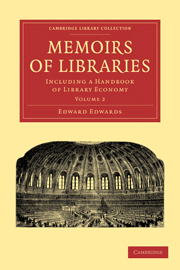Book contents
- Frontmatter
- Contents
- Chapter XV The Older Libraries of English Towns, and Their Management By Munic
- Chapter XVI The Parochial and Quasi-Parochial Libraries of England
- Chapter XVII The History of The “Public Libraries Acts” of 1850 and 1855
- Chapter XVIII The Working of The Public Libraries Acts of 1850 and 1855
- Appendix to Volume I
- Part The First. History of Libraries (Continued.)
- Book IV. The Libraries of The United States of America
- Book V. The Modern Libraries of Continental Europe
Chapter XVIII - The Working of The Public Libraries Acts of 1850 and 1855
Published online by Cambridge University Press: 29 August 2010
- Frontmatter
- Contents
- Chapter XV The Older Libraries of English Towns, and Their Management By Munic
- Chapter XVI The Parochial and Quasi-Parochial Libraries of England
- Chapter XVII The History of The “Public Libraries Acts” of 1850 and 1855
- Chapter XVIII The Working of The Public Libraries Acts of 1850 and 1855
- Appendix to Volume I
- Part The First. History of Libraries (Continued.)
- Book IV. The Libraries of The United States of America
- Book V. The Modern Libraries of Continental Europe
Summary
Separation between “Class” and “Class” is The great curse of British society ; for which we are all more or less, in our respective spheres, responsible. It is more complete in Manufacturing than in Agricultural districts… . But I am afraid we all of us keep too much aloof from those beneath us; and this encourages Them to look upon us with suspicion and dislike. . . . . The great want of English society is The mingling of class with class; The want of sympathy.
TALFOURD (Charge to The Grand Jury at Stafford [at The moment of his death], 13 March 1854.)In educational matters, it is The best economy in The end to make “Saving” not The principal but a secondary consideration. - A man, whose mind is always bent upon “Saving,” wilf be sure to do things imperfectly and insufficiently; to leave errors and arrears; and to provoke a certain re-action towards lavish expenditure.
The TIMES (23rd March 1857).§ 1.—GENERAL VIEW of The RECEPTION of The ACT IN ENGLISH TOWNS.
The first Library established under The “Public Libraries Act,” of 1850, was that of Manchester. The working of The Public Libraries preliminary subscription towards The expenses of its Acts. foundation had been set on foot, whilst The Bill was still pending in The House of Commons, by Sir John Potter, now one of The Representatives of The City, of which he was Then Mayor. Small but useful collections working of The of books had previously been formed, chiefly by donation, at Warrington and at Salford (both in Lancashire), as appendages to Museums maintained under The provisions of The “Museums Act” of 1845. The Town of Warrington adopted this Act in 1848, and obtained The transfer to The Corporation of a Museum of Natural History, and of a small Library (formed in 1760), both of which had belonged to Societies. The Borough of Salford adopted The Museum Act in 1849, mainly at The recommendation of its late esteemed Member, Mr. Brotherton, who from The first had taken a keen interest in The inquiries of The Public Libraries Committee, of which he was an assiduous member.
- Type
- Chapter
- Information
- Memoirs of LibrariesIncluding a Handbook of Library Economy, pp. 793 - 818Publisher: Cambridge University PressPrint publication year: 2010First published in: 1859



